- Home
- Dan Simmons
Drood Page 3
Drood Read online
Page 3
“I see the guards and possibly a doctor coming,” Dickens said into the tiny aperture, squeezing her arm and hand all the while. He did not know for sure if the approaching gentleman in the brown suit who carried a leather bag was indeed a doctor, but he fervently hoped so. The four guards, carrying axes and iron pry rods, were jogging ahead, the gentleman in the formal suit puffing to keep up.
“Over here!” Dickens cried to them. He squeezed the woman’s hand. Her pale fingers squeezed back, the first finger closing, opening, and then curling and closing again around his first fingers much as a newborn baby would instinctively but tentatively grasp its father’s hand. She said nothing, but Dickens heard her sigh from the shadows. It seemed almost a contented sound. He held her hand in both of his and prayed that she was not seriously injured.
“Here, for God’s sake, hurry!” cried Dickens. The men gathered around. The heavy, suited man introduced himself—he was a physician by the name of Morris—and Dickens refused to relinquish either his place by the wrecked window or the young lady’s hand as the four guards began levering the window frame and smashed wood and iron upward and to the side, enlarging the tiny space that had somehow been the woman’s shelter and salvation.
“Careful now!” shouted Dickens to the guards. “With great care, by all means! Allow nothing to fall. Careful with the bars there!” Crouching lower to speak into the dark space, Dickens fiercely gripped her hand and whispered, “We almost have you, my dear. Another minute. Be brave!”
There came a last, answering squeeze. Dickens could feel the gratitude in it.
“You’ll have to get back a minute, sir,” said Dr Morris. “Back just a moment while the boys heave and lift here and I lean in to see if she is too injured to move yet or not. Just for a moment, sir. That’s a good gentleman.”
Dickens patted the young lady’s palm, his fingers reluctant to release her, feeling the final, parting pressure from her thin, pale, perfectly manicured fingers in return. His mind pushed away the very real but totally inappropriate sense of there being something physically exciting in such intimate contact with a woman whose acquaintance he had not yet made and whose face he had not yet seen. He said, “You’ll be out of all of this and safe with us in a moment, my dear” and surrendered her hand. Then he crawled backwards on all fours, clearing the way for the workmen and feeling the marsh moistness seeping up through the knees of his trousers.
“Now!” cried the doctor, kneeling where Dickens had been a moment before. “Put your backs into it, boys!”
The four burly guards literally put their backs into it, first lifting with their pry bars and then setting their backs against the ragged wall of collapsed flooring that now became a heavy pyramid of wood. The cone of darkness widened a bit beneath them. Sunlight illuminated the wreckage. They gasped as they strained to hold the debris up and then one of the men gasped again.
“Oh, Christ!” cried someone.
The doctor seemed to leap back as if he had touched an electrified wire. Dickens crawled forward to offer his help and finally saw into the space.
There was no woman, no girl. Only a bare arm severed just below the shoulder lay in the tiny open circle amidst the debris. The knob of bone looked very white in the filtered afternoon light.
Everyone shouted. More men arrived. Instructions were repeated. The guards used their axes and iron bars to pry open the wreckage, carefully at first and then with a terrible, almost wilfully destructive abandon. The rest of the young woman’s body simply was not there. There were no complete bodies anywhere in this pile of wreckage, only mismatched tatters of torn clothing and random bits of flesh and gouged bone. There was not so much as an identifiable scrap of her dress left behind. There was only the pale arm ending in the bloodless and tightly curled and now motionless fingers.
Without another word, Dr Morris turned and walked away, joining other rescuers milling around other victims.
Dickens got to his feet, blinked, licked his lips, and reached for his flask of brandy. It tasted of copper. He realised that it was empty and that he was tasting only the blood left on it from some of the victims to whom he had offered it. He looked around and around for his top hat and then saw that he was wearing it. River water from it had soaked his hair and dripped down his collar.
More rescuers and onlookers were arriving. Dickens judged that he could be of little further help there. Slowly, awkwardly, he climbed the steep riverbank up to the railbed where the intact carriages now sat empty.
Ellen and Mrs Ternan were sitting in the shade on some stacked rail ties, calmly drinking water from teacups someone had brought them.
Dickens started to reach for Ellen’s gloved hand and then did not complete the motion. Instead, he said, “How are you, my dear?”
Ellen smiled, but there were tears in her eyes. She touched her left arm and an area just below her shoulder and above her left breast. “A bit bruised, I believe, but otherwise well. Thank you, Mr Dickens.”
The novelist nodded almost absently, his eyes focused elsewhere. Then he turned, walked to the edge of the broken bridge, jumped with the easy agility of the distracted to the step of the dangling first-class carriage, crawled through a shattered window as easily as if it were a doorway, and clambered down through rows of seats that had become rungs on the now-vertical wall of the coach floor. The entire carriage, still dangling precariously high above the valley floor and connected by only one coupling to the second-class carriage on the rails above, swayed slightly like a vibrating pendulum in a broken hallway clock.
Earlier, even before rescuing Ellen and Mrs Ternan, he had carried out his leather bag carrying most of the manuscript of the sixteenth number of Our Mutual Friend, which he had been working on in France, but now he had remembered that the last two chapters were in his overcoat, which still lay folded in the overhead above their former seats. Standing on the backs of this last row of seats in the swaying, creaking coach, the river thirty feet below reflecting darts of dancing light through the shattered windows, he retrieved the overcoat, pulled the manuscript out to make sure that all the pages were there—it had been slightly soiled but was otherwise intact—and then, still balancing on the seats, he tucked the papers back into his overcoat.
Dickens then happened to look straight down, down through the shattered glass of the door at the end of the carriage. Far below, directly beneath the train car, some trick of the light making him appear to be standing on the river rather than in it, apparently totally unconcerned by so many tons of wood and iron swaying above him, the person who called himself Drood was tilting his head far back to stare straight up at Dickens. The man’s pale eyes in their sunken sockets seemed to have no eyelids.
The figure’s lips parted, its mouth opened and moved, the fleshy tongue flickered out from behind and between the tiny teeth, and hissing sounds emerged, but Dickens could make out no distinct words over the metallic groaning of the dangling carriage and the continuous cries of the injured in the valley below. “Unintelligible,” murmured Dickens. “Unintelligible.”
The first-class carriage suddenly swayed and sagged as if preparing to drop. Dickens casually caught the overhead with one hand to keep his balance. When the swaying ceased and he looked down again, Drood was gone. The writer tossed the coat with his manuscript in it over his shoulder and clambered up and out into the light.
CHAPTER TWO
Iwas out of town on the day of my friend’s disaster at Staplehurst, so it was a full three days after the accident that I received a message from my younger brother, Charles, who had married Dickens’s oldest daughter, Kate, telling me of the novelist’s brush with death. I immediately hurried down to Gad’s Hill Place.
I would presume, my Dear Reader who resides in my impossibly distant and posthumous future, that you remember Gad’s Hill from Shakespeare’s Henry IV. You do remember Shakespeare even if all the rest of us scribblers have been lost to the fogs of history, do you not? Gad’s Hill is where Falstaff plans a robbery bu
t is foiled by Prince Hal and a friend who disguise themselves as robbers wishing to rob the robber; after the fat Sir John flees in terror, his retelling of the story has Hal and his accomplice become four brigands, then eight, then sixteen, and so forth. There is a Falstaff Inn very close to Dickens’s home, and I believe that the author enjoyed his home’s connection to Shakespeare as much as he enjoyed the ale that the inn served him at the end of his long walks.
As I approached the home in a carriage, I was reminded that Gad’s Hill Place had yet another claim on Charles Dickens’s emotions, one that long predated his purchase of the place a decade earlier in 1855. Gad’s Hill was in Chatham, a village that blended into the cathedral town of Rochester about twenty-five miles from London, an area where the writer had spent the happiest years of his childhood and one to which he returned constantly as an adult, roaming there rather like some restless ghost searching for his final haunting ground. The house itself—Gad’s Hill Place—had been pointed out to the seven- or eight-year-old Charles Dickens by his father on one of their countless walks; John Dickens had said something to the effect that “If you work hard enough, my boy, and apply yourself, such a mansion might one day be yours.” Then, on that boy’s forty-third birthday in February of 1855, Dickens had taken some friends to Chatham on one of his regular sentimental hauntings and discovered, to his real shock, that the unobtainable mansion of his youth was for sale.
Dickens was the first to admit that Gad’s Hill Place was not so much a mansion as it was a moderately comfortable country house—in truth, the author’s former home Tavistock House had been more imposing—although after purchasing Gad’s Hill Place, the writer did pour a small fortune into renovating, modernising, decorating, landscaping, and expanding it. At first he had planned to use his late father’s dream of opulence as a rental property, then began to think of it as a sometime country home, but after the bitter unpleasantness of his separation from Catherine, he first leased out Tavistock House and then put that city house up for sale, making Gad’s Hill Place his primary residence. (His habit, though, was to keep several places in London for occasional—and sometimes secret—residence, including quarters above his office at our magazine All the Year Round.)
Dickens had told his friend Wills upon purchasing the place—“I used to look at it as a wonderful mansion (which God knows it is not) when I was a very odd little child with the first shadows of all my books in my head.”
As my carriage turned off the Gravesend Road and rolled up the curved drive towards the three-storey redbrick home, I thought of how those shadows had taken on substance for hundreds of thousands of readers and how Dickens, in turn, now lived within those very substantial walls that his incorrigible father, a failure in the arenas of both family and finances, had once held up to his son as the highest possible reward of domestic and professional ambition.
A MAID-SERVANT ADMITTED me and Georgina Hogarth, Dickens’s sister-in-law and now the mistress of the home, greeted me.
“How is the Inimitable?” I asked, using the author’s favourite sobriquet for himself.
“Very shaken, Mr Collins, very shaken,” whispered Georgina and held one finger to her lips. Dickens’s study was off the entryway to the right. The doors were closed but I knew from my many visits and stays at Gad’s Hill that the master’s study doors were always closed, whether he was there working or not. “The accident upset him so much that he had to spend the first night at his apartment in London with Mr Wills sleeping outside the door,” she continued in her stage whisper. “In case Mr Wills might be needed, you know.”
I nodded. First hired as an assistant for Dickens’s magazine Household Words, the eminently practical and unimaginative William Henry Wills—in so many ways the opposite of the mercurial Dickens—had become one of the famous author’s closest friends and confidants, moving aside such older friends as John Forster.
“He’s not working today,” whispered Georgina. “I’ll see if he wants to be disturbed.” She approached the study doors with some obvious trepidation.
“Who is it?” came a voice from within the study when Georgina knocked lightly.
I say “a voice” because it was not Charles Dickens’s voice. The novelist’s voice, as all who knew him long remembered, was low, quick, and burdened with a slight thickness which many mistook for a lisp and which had caused the writer, in recompense, to over-enunciate his vowels and consonants so that the rapid but very careful and rolling elocution sometimes sounded pompous to those who did not know him.
This voice was nothing like that. It was the reed-thin quaver of an old man.
“It’s Mr Collins,” said Georgina to the oak of the doorway.
“Tell him to go back to his sickroom,” rasped the old man’s voice from within.
I blinked at this. Since my younger brother, Charles, had married Kate Dickens five years earlier, he had suffered bouts of serious indigestion and occasional ill health, but—I was certain at the time—it was nothing serious. Dickens thought otherwise. The writer had opposed the marriage, had felt that his favourite daughter had married Charles—a sometimes illustrator of Dickens’s books—just to spite him, and obviously had convinced himself that my brother was dying. I’d recently heard on good authority that Dickens had said to Wills that my dear brother’s health rendered him “totally unfit for any function of this life,” and even had it been true—which it absolutely was not—it was a remarkably callous thing to say.
“No, Mr Wilkie,” Georgina said through the doors, glancing apprehensively over her shoulder as if in hopes that I had not heard.
“Oh,” came some oldster’s quavering syllable. “Why the deuce didn’t you say so?”
We heard vague scrambling and scrabbling sounds and then the turning of a key in the lock—which was extraordinary in itself, as Dickens had the odd habit of locking his study when he was not in it but never when he was—and then the doors were thrown open.
“My dear Wilkie, my dear Wilkie,” said Dickens in that odd rasp, throwing his arms open wide, then clasping my right shoulder with his left hand briefly before removing it to join the other hand that was enthusiastically shaking mine. I noticed that he was glancing at his watch on its chain. “Thank you, Georgina,” he added absently as he closed the doors behind us, not locking them this time. He led the way into his dark study.
Which was another oddity. As many times as I had visited Dickens in his sanctum sanctorum over the years, I had never seen the drapes drawn across the bow windows in the daytime. They were now. The only light came from the lamp on the table in the centre of the room; there was no lamp on the writing desk that faced those three windows and which was set into the small bay they created. Only a few of us had been privileged to see Dickens actually in the act of creation in this study, but all of us who had must have noted the mild irony that Dickens invariably faced the windows looking out into his garden and towards Gravesend Road but never saw anything of the scene before him when he looked up from his quill and paper. The writer was lost in the worlds of his own imaginings and effectively blind while working, except when glancing into a nearby mirror to see his own expressions while acting out the grimaces, grins, frowns, expressions of shock, and other caricature-like responses of his characters.
Dickens pulled me deeper into the dark room and waved me to a chair near his desk and sat in his cushioned work chair. Except for the closed drapes, the room looked as it always had—everything neat and orderly in an almost compulsive manner (and without a hint of dust, even though Dickens never allowed the servants to dust or clean in his study). There was the desk with its tilted writing surface, the little array of his carefully arranged tools, never out of order, arrayed like talismans on the flat part of the desk—a date calendar, ink-bottle, quills, a pencil with a nearby India rubber eraser that looked to have never been used, a pincushion, a small bronze statuette of two toads duelling, a paper-knife aligned just so, a gilded leaf with a stylised rabbit on it. These were his good-luck sy
mbols—his “appurtenances,” Dickens called them, something, he once said to me, “for my eye to rest on during the intervals between writing”—and he could no more write at Gad’s Hill without them than he could without his goose quills.
Much of the study was lined with books, including shelves of false books—most with ironic titles of Dickens’s own invention—that he’d had made for Tavistock House and which now were set into the back of the door, and the real built-in bookcases that circled the room were broken up only by the windows and a handsome blue-and-white fireplace decorated with twenty Delft tiles.
Dickens himself looked almost shockingly aged this June-day afternoon, his encroaching baldness, deep-set eyes, and the wrinkles and lines in his face emphasised by the harsh light from the gas lamp on the table behind us. He kept glancing at his unopened watch.
“So good of you to come, my dear Wilkie,” rasped Dickens.
“Nonsense, nonsense,” I said. “I would have been here sooner had I not been out of town, as I trust my brother informed you. Your voice sounds strained, Charles.”
“Strange?” said Dickens with a flash of a smile.
“Strained.”
He barked a laugh. Very few conversations with Charles Dickens did not include a laugh from him. I had never met a man so given to laughter. Almost no moment or context was too serious for this author not to find some levity in it, as some of us had discovered to our embarrassment at funerals.
“Strange is more appropriate, I would venture,” said Dickens in that odd old-man’s rasp. “I most unaccountably brought someone else’s voice out of the terrible scene of the Staplehurst disaster. I do wish that person would return my voice and take back his own.… I find this ageing-Micawber tone not at all to my liking. It feels rather as if one is applying sandpaper simultaneously to vocal cords and vowels.”

 The Terror
The Terror Endymion
Endymion Hyperion
Hyperion The Crook Factory
The Crook Factory Ilium
Ilium Phases of Gravity
Phases of Gravity Hardcase
Hardcase Fires of Eden
Fires of Eden Children of the Night
Children of the Night Muse of Fire
Muse of Fire Drood
Drood The Fifth Heart
The Fifth Heart Carrion Comfort
Carrion Comfort The Hollow Man
The Hollow Man Summer of Night
Summer of Night The Fall of Hyperion
The Fall of Hyperion Black Hills
Black Hills A Winter Haunting
A Winter Haunting Hard Freeze
Hard Freeze Prayers to Broken Stones
Prayers to Broken Stones Hard as Nails
Hard as Nails The Guiding Nose of Ulfant Banderoz
The Guiding Nose of Ulfant Banderoz The Rise of Endymion
The Rise of Endymion Orphans of the Helix
Orphans of the Helix Lovedeath
Lovedeath Olympos
Olympos Darwin's Blade
Darwin's Blade Song of Kali
Song of Kali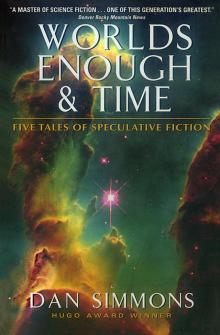 Worlds Enough & Time: Five Tales of Speculative Fiction
Worlds Enough & Time: Five Tales of Speculative Fiction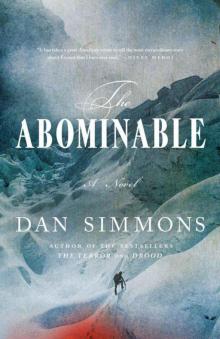 The Abominable
The Abominable The Death of the Centaur
The Death of the Centaur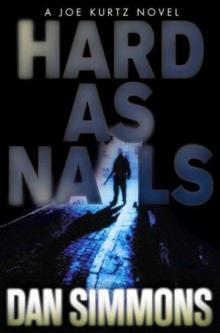 Hard as Nails jk-3
Hard as Nails jk-3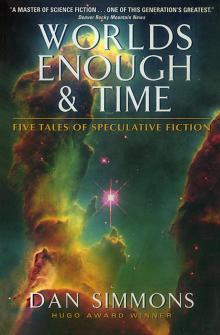 Worlds Enough & Time
Worlds Enough & Time Joe Kurtz Omnibus
Joe Kurtz Omnibus The Hyperion Cantos 4-Book Bundle
The Hyperion Cantos 4-Book Bundle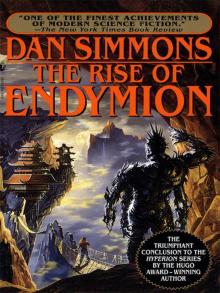 Rise of Endymion
Rise of Endymion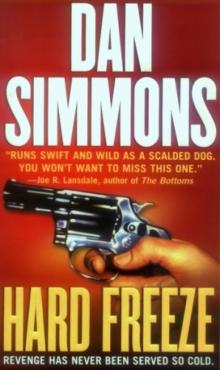 Hard Freeze jk-2
Hard Freeze jk-2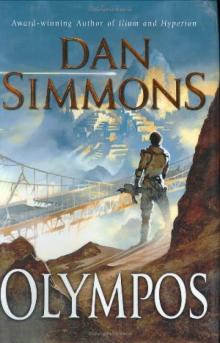 Olympos t-2
Olympos t-2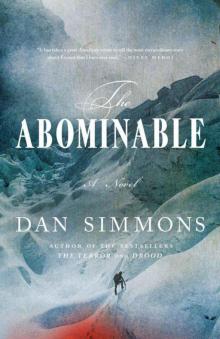 The Abominable: A Novel
The Abominable: A Novel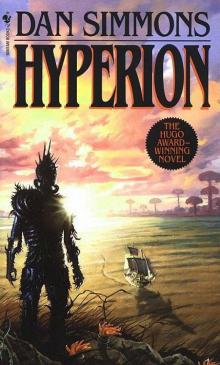 Hyperion h-1
Hyperion h-1 Remembering Siri
Remembering Siri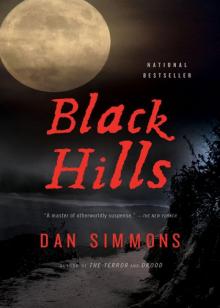 Black Hills: A Novel
Black Hills: A Novel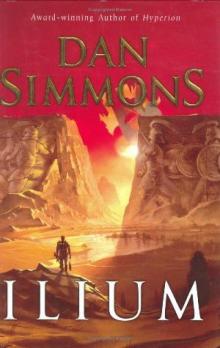 Ilium t-1
Ilium t-1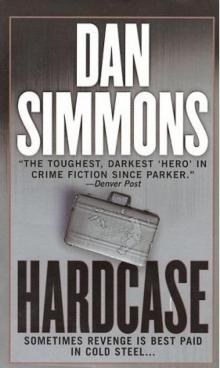 Hardcase jk-1
Hardcase jk-1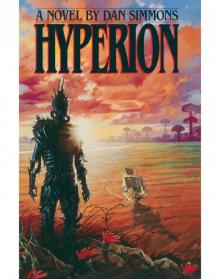 Hyperion 01 - Hyperion
Hyperion 01 - Hyperion